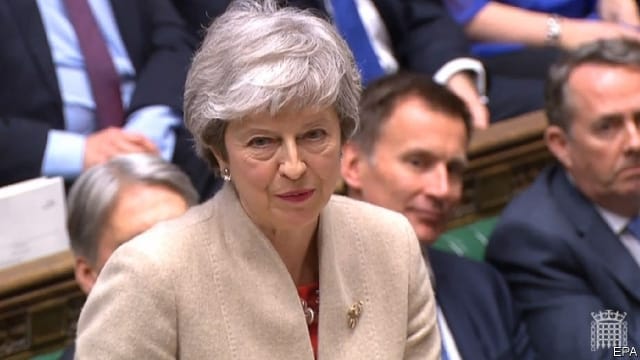
Theresa May loses again, again
MPs reject the Brexit withdrawal agreement for a third time—but by much less than before
MARCH 29TH was meant to be the day when Britain left the European Union. Instead, Theresa May marked the day by losing yet another Commons vote on her Brexit deal. Yet the margin of the prime minister’s defeat was significantly smaller than in the two previous votes. She was defeated by 58 votes, having previously lost by 149 on March 12th and 220 on January 15th.
The vote this time was not technically a third “meaningful vote” because it was only on the Brexit withdrawal agreement, excluding the political declaration about the future relationship that accompanies it. Nevertheless, the EU said in advance that, if the vote passed, that would be sufficient to extend the Brexit deadline to May 22nd, as the European Council summit agreed last week. Now that it has failed, however, the legal deadline becomes April 12th, which is just two weeks away.
What happens next? Because Mrs May’s margin of defeat has come down, she may try to hold yet another vote—though the Commons Speaker, John Bercow, has ruled against putting the same issue to repeated votes. Yet even if she finds a way round Mr Bercow, the chances are that she will lose the vote again. Opposition to the deal from her own party hardliners and from the Democratic Unionist Party in Northern Ireland remains entrenched, and the Labour leader, Jeremy Corbyn sees no reason why he should rescue the prime minister.
Meanwhile on April 1st MPs will hold a second round of indicative votes on what kind of Brexit they prefer. As in the first round, it is possible that no plan will secure a majority. But it is just as likely that at least one proposal, most probably the idea of joining a permanent customs union with the EU, will pass. So might a plan to hold a referendum on any Brexit deal.
The government is not bound to pay attention to these indicative votes. But unless it can win approval for its Brexit deal, it will have to come up with some plan before April 12th if it is to avert a no-deal Brexit, which MPs have also voted against. Another European Council will be held on April 10th. That meeting will ask Mrs May to indicate a way forward.
That could be to suggest amending the political declaration to include a permanent customs union. It is also possible that Mrs May could opt for an early election or even another referendum. At the same time, she will request yet another extension to the deadline. EU leaders are reluctant to agree to this, because they do not want merely to witness more long drawn-out debates in London. Yet they also want to avoid a no-deal outcome, especially ahead of the European Parliament elections at the end of May. So they will probably agree to extend the deadline at least to the end of May, and possibly beyond. But one condition they will set is that, if Britain is a member, it must also participate in those elections.
That will throw the issue back to Mrs May, who has said it would be wrong for Britain to hold European elections. But faced with a no-deal alternative on April 12th, she will surely have to give way. So despite the June 2016 decision by voters to leave the EU, she will be asking them to elect MEPs almost three years later. It is perhaps little wonder that she plans to resign before the next phase of Brexit negotiations—or that there were so many protesters this week outside Parliament.